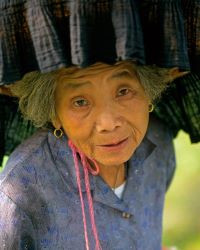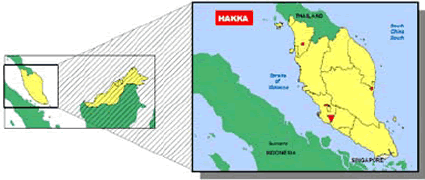Hakka speaking Chinese are the sixth largest Chinese dialect spoken among Chinese in Malaysia. Originally, the ethnic Hakka trace their ancestry to the early immigrants who came from the various provinces of Southeastern China. The early immigrants were from northern China. They had migrated to become sojourners in the southern provinces between the 4th and 18th centuries. Thus, they are called Hakka, Kechia, or Khek, which means "guest people" in Chinese. Although the Hakka dialect may contain elements from both Mandarin and Cantonese, it is a distinct language in its own right.
Hakka-speaking Chinese are widely dispersed throughout Malaysia, usually in more rural areas. Chinese-speaking Hakka can be found in the states of Kedah, Negri Sembilan, Perak, Pahang, and Sabah.
The early Hakka settlers in Malaysia in the 18th and 19th century were gold-miners, tin-miners, and cash crop farmers. They were also proprietors of Chinese medicine shops and tailors. Today, with the rapid socio-economic changes in Malaysia, they work in a variety of professions. They are businessmen, lawyers, doctors, tour operators, and also factory workers.
The Hakka, a very distinct group of people, are regarded as very conservative, honest, hardworking, and independent.
A traditional Hakka family would include a husband and wife, their married sons with their wives and children, and daughters, if unmarried, all under one roof.
Most of Hakka community consider themselves Buddhists. But what they generally practice is the same Chinese religion of the other dialect groups. Their religion is actually a collection of ancient beliefs and rituals that incorporated elements of Buddhism, Confucianism, and Taoism passed down through generations. Most Hakka households have an icon of the warrior deity Guandi (a deity renowned for his loyalty, righteousness, courage, and sense of brotherhood) continuing a practice of the early immigrants, they often pray to Guandi for divine power to stay united.
Like the Chinese of other groups, the Hakka typically fear dying outside of their own homes. After all (they reason) how can their spirit be expected to find its way back to where it can be cared for? That's why you'll find very sick Hakka people checking out of the hospital and moving back home before they die. A small percentage of the Hakka are Christian.
Rapid socio-economic changes in Malaysia are driving many Hakka to live away from their communities. They want good education, higher wages, and a better lifestyle. These same socio-economic changes may also lead to changing recognition, or lack thereof.
Pray that resourceful and committed believers will be enablers to the Hakka in their search for a better life.
Pray that the Hakka might see God's love in these enablers and that his love would flow back to their own communities.
Pray for Hakkas to take the gospel to the many Muslim people in Malaysia. May the Lord give them boldness and love.
Scripture Prayers for the Han Chinese, Hakka in Malaysia.
Southeast Asia Link – SEALINK, Copyrighted © Used with permission.
| Profile Source: Joshua Project |













